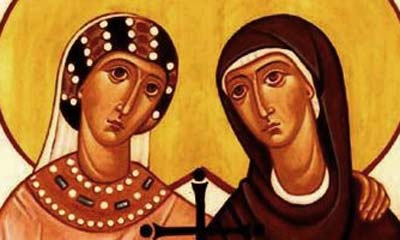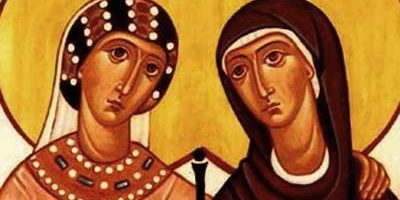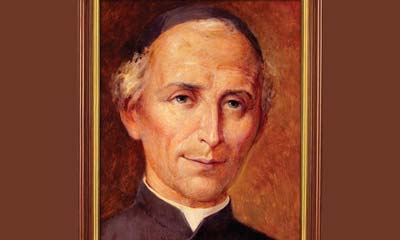November 11, 2019
Saints Perpetua and Felicity
Dear Friends,
Commenting on these words of Our Lord, “For whoever wants to save his life will lose it, but whoever loses his life for my sake will save it” (Luke 9:24), Pope Francis said, “In 2,000 years, a vast host of men and women have sacrificed their lives to remain faithful to Jesus Christ and his Gospel. And today, there are many martyrs—more than in the first centuries—who are led to their deaths for refusing to deny Jesus Christ” (Address during the Angelus on June 23, 2013).
 In the third century, persecution of Christians, seen as public enemies by the Roman Empire, resulted in countless victims. Septimius Severus, the first Roman emperor born in Africa, issued an edict against the followers of Christ that struck at all new Christians. The most illustrious among them were catechumens (candidates for baptism) or neophytes (the newly baptized). The Church of Africa was particularly hard hit. Under this emperor, Perpetua and Felicity, two young women from very different backgrounds, were martyred in 202 or 203, probably in Carthage (now in Tunisia), along with four other Christians—Revocatus, Saturninus, Saturus, and Secondulus. Soon accounts of their martyrdom were read in churches. According to St. Augustine, “These two holy martyrs [Perpetua and Felicity]… in return for such a great labor of piety, signified by their own names the reward awaiting them. The only reason why all the martyrs toiled bravely for a time by suffering and confessing the faith in the struggle was in order to enjoy perpetual felicity. So it was by an ordination of divine providence that these women had to be, and were, not only martyrs, but also the closest companions. Both were mothers, which made them even more sensitive to suffering, inspiring the enemy to believe they would give in to him straightaway and very soon be his to gloat over” (Sermon 282). Historians view the three documents that recount their martyrdom, including Perpetua’s own diary, as unquestionably authentic.
In the third century, persecution of Christians, seen as public enemies by the Roman Empire, resulted in countless victims. Septimius Severus, the first Roman emperor born in Africa, issued an edict against the followers of Christ that struck at all new Christians. The most illustrious among them were catechumens (candidates for baptism) or neophytes (the newly baptized). The Church of Africa was particularly hard hit. Under this emperor, Perpetua and Felicity, two young women from very different backgrounds, were martyred in 202 or 203, probably in Carthage (now in Tunisia), along with four other Christians—Revocatus, Saturninus, Saturus, and Secondulus. Soon accounts of their martyrdom were read in churches. According to St. Augustine, “These two holy martyrs [Perpetua and Felicity]… in return for such a great labor of piety, signified by their own names the reward awaiting them. The only reason why all the martyrs toiled bravely for a time by suffering and confessing the faith in the struggle was in order to enjoy perpetual felicity. So it was by an ordination of divine providence that these women had to be, and were, not only martyrs, but also the closest companions. Both were mothers, which made them even more sensitive to suffering, inspiring the enemy to believe they would give in to him straightaway and very soon be his to gloat over” (Sermon 282). Historians view the three documents that recount their martyrdom, including Perpetua’s own diary, as unquestionably authentic.
The Christian catechumens were arrested because of their faith, probably after being denounced. Perpetua was 22 years old, of noble birth and cultivated. She had two brothers, one of whom was also a catechumen, as well as an infant son she was nursing. Felicity, a slave who was also married, was seven or eight months pregnant. After their arrest, these two young women remained with their persecutors for several days without being imprisoned. Perpetua’s father, driven by his love for her, pleaded with her to renounce her faith: “Father,” she asked, “do you see that pitcher there on the ground?” – “Yes, I see it.” he replied. – “Can it be called by any name other than what it is?” – “No.” – “Well neither can I call myself anything other than what I am—a Christian.” Angered by her words, her father lunged at her to strike her, but to no avail. In the following days, Perpetua didn’t see her father again. She thanked the Lord for His help, and regained her strength. Soon after, she was baptized with the other catechumens, saying, “The Holy Spirit instructed me to ask for no other favor from the water but the strength to withstand the torments.”
Perpetua and Felicity were imprisoned solely for their Christian faith, as noted in the Acts of their martyrdom. They had understood that those who are baptized, “become sons of God…and must confess before men the faith which they have received from God through the Church” (Lumen Gentium Constitution of the Second Vatican Council, No. 11). In the Roman Empire, emperors were worshipped as gods. The Christian religion was therefore not tolerated, since it had only one God, who must be obeyed above any human law.
Perpetua described what she went through in her diary: “A few days later we were thrown into prison; and I was terrified, as I had never been in such darkness. Oh day of terror! Because we were so many, the heat was suffocating, and the extortion of the soldiers! Above all, I was consumed with worry for my baby. Then Tertius and Pomponius, those blessed deacons who watched over us, bribed the soldiers to allow us a bit of leave to regain our strength. Once out of prison, each was free to do what they needed. I nursed my baby, already half dead from starvation. I spoke to my mother about my anxiety for the baby; I tried to comfort my brother, and I entrusted the baby to them. I was in pain because I saw them suffering on account of me. Such were the trials I had to endure for many days. Then I got permission for my baby to stay with me in prison, and I was immediately better, relieved as I was of my worry and anxiety over the child. Prison had suddenly become a palace, where I preferred be over anywhere else.”
In God’s power
“Then word spread that we were going to be interrogated,” Perpetua continued. “My father arrived from the city, sadness painted on his face, consumed with grief. ‘Daughter,’ he cried, ‘have pity on my gray head—have pity on your father, if I still deserve the name father, if I have favored you above all your brothers, if I have raised you to reach this prime of your life. Do not abandon me to be the reproach of men. Think of your brothers, your mother, look at your baby, who will not be able to survive if you die. Let go of your pride! And do not make us all die of grief. None of us will ever dare speak without fear if you are condemned to torture.’ My father spoke thus out of love for me, kissing my hands, throwing himself at my feet, calling me no longer his daughter but his lady. I was filled with sorrow, thinking he would be the only one in my family not to rejoice in our martyrdom. To console him I said: ‘When we are on the platform nothing will happen to us that does not please God; know well that we are not in our own power, but that of God.’ And he left crushed with grief.
“Then one day, during our meal, we were suddenly hurried off for a hearing. We arrived at the forum. Word spread right away and a huge crowd gathered. We climbed onto the platform. When questioned, all the others loudly professed Jesus Christ. When they came to me, my father appeared all of a sudden, carrying my son, and tugging at me begged me, ‘Perform the sacrifice!’ (to the pagan gods—signifying denial of Christ). ‘Have pity on your child!’ And Hilarianus the governor said to me: ‘Spare your father’s white hair; spare your infant son. Offer sacrifice to the emperors.’
I replied ‘No, I will not offer sacrifice.’ – ‘Are you then a Christian?’ he asked. – ‘Yes, I am.’ Meanwhile my father, still hoping to win me over, remained standing there. Hilarianus ordered the guards to chase him away, and one of them hitting him with a rod. I felt the blow as though I myself had received it, so much did I suffer to see my father so ill-treated in his old age, and for my sake. The judge then pronounced sentence on all of us: we were condemned to be delivered to the beasts. Filled with joy, we returned to prison. As at the time I was nursing my baby and keeping him with me, I sent the deacon Pomponius to my father to ask for him, but father refused to give the baby over. But God arranged that the baby no longer asked for the breast, and I did not suffer from lactation; so I was free of any anxiety.”
As Saint Paul stated: “Indeed all who desire to live a godly life in Christ Jesus will be persecuted” (2 Tim. 3:12). By resisting her father’s pathetic entreaties, Perpetua made Jesus’ words, addressed to all, her own: “Whoever loves father or mother more than me is not worthy of me” (Matt. 10:37). As Saint Jerome said, “Jesus does not prevent us from loving our father or mother, but he explicitly states it must not be ‘more than me.’” And Saint Hilary said, “For they who have esteemed domestic affection of relations higher than God, are unworthy to inherit good things to come” (see Saint Thomas, Catena Aurea, on Matt. 10:37-39). More generally, pagans mocked the martyrs for disdaining the joys of this world and agreeing to suffer its torments because of their vain trust in an imaginary good. But those Christians knew that theological hope is “sure and steadfast” (Heb. 6:19), because it is founded on God’s promises. “Hope does not disappoint!” (Rom. 5:5).
Another will suffer for me!
As for Felicity, she trembled at the thought that her martyrdom would be postponed, because pregnant women could not be executed. She feared she would have to shed her pure and innocent blood alongside criminals rather than with the condemned Christians. Her comrades in martyrdom were also profoundly distressed, worried they would have to abandon her who shared so well the path that led to their common hope. Two days before the circus games, uniting their hearts in a single intention, they flooded the Lord with prayer. They barely finished when the young woman went into labor. During the excruciating pain of the childbirth, one of the prison guards said to her, “If you scream so much at the pain now, what will it be like when you are thrown to the beasts, which you little thought of when you refused to sacrifice?”
Felicity replied, “Today it is I who is suffering what I suffer, but then it will be another in me who will suffer for me, because I too will be suffering for him.” She finally gave birth to a girl, who would be raised by a Christian woman as her own. The evening before the combat, the prisoners had their last meal, which was called “free”, which they made into an agape feast as best they could. They spoke words full of strength to the crowd surrounding them: warning them of God’s judgment, witnessing to their joy in submitting to their passion, and mocking the curiosity of those who ran to gape at them. Saturus asked the mob, “Will not tomorrow be enough for you? What pleasure do you take in seeing those you detest? At least take careful note of our faces so that you will recognize us on the Great Day.” So these pagans were stunned. They left them alone, and many even began to believe.
Of our own free will
Then the day of victory came. The condemned left the prison for the amphitheater joyful, with the serene countenances of those going to heaven. They trembled with joy rather than fear. Perpetua marched behind them, her face shining, her steps steady, like a spouse untied to Christ, like the beloved daughter of God. The radiance of her gaze forced onlookers to lower their eyes. Felicity did the same, rejoicing that she had given birth and so was able to face the beasts with the other martyrs, going from one bath of blood to another, from that of the midwife to that of the gladiator, ready to be cleansed after the childbirth by a second baptism. At the entrance to the amphitheater, the custom was to force them to don costumes: the robes of priests of Saturn for the men, those of the priestesses of Ceres for the women. Perpetua resisted and firmly refused, saying, “We have come here of our own free will, in order that our freedom should not be violated; we have delivered our lives in order not to perform such an act; this is what we have agreed to with you.” The unjust magistrate recognized the truth of her words, and the soldiers let them enter the arena dressed as they were. Perpetua sang a hymn. When they arrived before Hilarianus, the martyrs cried, “For us, you are the judge, but for you, it is God!” The crowds, enraged by this bravery, demanded they be beaten with rods, but the martyrs simply gave thanks for bearing a share of the Lord’s suffering.
One of the most savage cows was chosen for the two young women, as though to insult their sex. Perpetua was thrown to the ground on her back. When she came to, the young martyr noticed that her dress was ripped on the side. She pulled it back to cover herself, concerned more for her modesty than her pain. She put back up her loose hair, for it was not right for a martyr to suffer her passion with her hair loose, lest she appear to be in mourning in her moment of glory. Then she regained her feet, and seeing Felicity thrown to the ground, she went over to her and held out her hand to help her get up. The two women stood. The cruelty of the mob had been vanquished: they were led alive back to the “Door of Saved Life.”
Perpetua’s soul was pure and full of delicate modesty. “In the battle against disordered desires, the baptized person is able, by the grace of God, to achieve purity of heart through the virtue and gift of chastity, through purity of intention, purity of vision (both exterior and interior), discipline of the imagination and of feelings and by prayer. Purity requires modesty, which, while protecting the intimate center of the person, expresses the sensitivity of chastity. It guides how one looks at others and behaves toward them in conformity with the dignity of persons and their communion. Purity frees one from widespread eroticism and avoids those things that foster morbid curiosity. Purity also requires a purification of the social climate by means of a constant struggle against moral permissiveness which is founded on an erroneous conception of human freedom” (Compendium of the Catechism of the Catholic Church, Nos. 529-530).
Leaving the arena, Perpetua was stopped by a man named Rusticus, a catechumen. As though pulled from sleep, so absorbed had she been in ecstasy in the Spirit during the events, she looked around her and asked, to the amazement of all, “When are we going to be thrown to that notorious cow?” When she was told that it had all already happened, she did not believe it until she noticed the marks on her body and her dress. Then, having called for her brother and the catechumen, she said, “Remain firm in the faith, love one another, and do not be scandalized by what we suffer.” Since the mob was clamoring to see them in the arena for the final execution, the martyrs rose of their own accord and went there. After embracing one another in order to seal their martyrdom with the ritual kiss of peace, they all, immobile and in silence, received the blow of the sword.
Against the current
When announcing the Great Jubilee of the Year 2000, Saint John Paul II wrote, “In the hearts of the faithful, may admiration for their martyrdom be matched by the desire to follow their example, with God’s grace, should circumstances require it” (Incarnationis Mysterium, November 29, 1998). On World Youth Day in 2000, the Pope said to young people, “To believe in Jesus, to follow Jesus demands of us that we take a stand for Him, almost to the point of a new martyrdom: the martyrdom of those who, today as yesterday, are called to go against the tide in order to follow the divine Master, to ‘follow the Lamb wherever he goes’ (Rev. 14:4)… Perhaps you will not have to shed your blood, but you will certainly be asked to be faithful to Christ! A faithfulness to be lived in the circumstances of everyday life: I am thinking of how difficult it is in today’s world for engaged couples to be faithful to purity before marriage. I think of how the mutual fidelity of young married couples is put to the test. I think of friendships and how easily the temptation to be disloyal creeps in…” (August 19, 2000).
Pope Francis in turn asked, “What does it mean to ‘lose one’s life for the sake of Jesus?’ This can happen in two ways: explicitly by confessing the faith, or implicitly by defending the truth… How many just people prefer to go against the current, so as not to deny the voice of conscience, the voice of truth! To you young people I say: Do not be afraid to go against the current… and be proud of doing so… there are many people who lose their lives for truth! One of those was John the Baptist. He died for the sake of the truth, when he denounced the adultery of King Herod and Herodias” (June 23, 2013).
Saint John Paul II wrote: “A comparison between the Church’s teaching and today’s social and cultural situation immediately makes clear the urgent need for the Church herself to develop an intense pastoral effort precisely with regard to this fundamental question. This essential bond between Truth, the Good and Freedom has been largely lost sight of by present-day culture. As a result, helping man to rediscover it represents nowadays one of the specific requirements of the Church’s mission, for the salvation of the world. Pilate’s question, ‘What is truth?’ (John 18:38), reflects the distressing perplexity of a man who often no longer knows who he is, whence he comes and where he is going. Hence we not infrequently witness the fearful plunging of the human person into situations of gradual self-destruction. According to some, it appears that one no longer need acknowledge the enduring absoluteness of any moral value… Man is no longer convinced that only in the truth can he find salvation. The saving power of the truth is contested, and freedom alone, uprooted from any objectivity, is left to decide by itself what is good and what is evil. This relativism becomes, in the field of theology, a lack of trust in the wisdom of God, who guides man with the moral law. Concrete situations are unfavorably contrasted with the precepts of the moral law, nor is it any longer maintained that, when all is said and done, the law of God is always the one true good of man” (Veritatis Splendor, August 6, 1993, No. 84).
On the contrary, “Christ reveals, first and foremost, that the frank and open acceptance of truth is the condition for authentic freedom: ‘You will know the truth, and the truth will set you free’ (John 8:32). This is truth which sets one free in the face of worldly power and which gives the strength to endure martyrdom. So it was with Jesus before Pilate: ‘For this I was born, and for this I have come into the world, to bear witness to the truth’ (John 18:37). The true worshipers of God must thus worship him ‘in spirit and truth’ (John 4:23). In this worship they become free. Worship of God and a relationship with truth are revealed in Jesus Christ as the deepest foundation of freedom” (Ibid., No. 87).
An outstanding sign
The witness to the truth rendered by martyrs reminds us how far fidelity to the law of God must go: it reveals the difference that exists between good and evil. “Martyrdom is an outstanding sign of the holiness of the Church”, wrote Saint John Paul II, “Fidelity to God’s holy law, witnessed to by death, is a solemn proclamation and missionary commitment usque ad sanguinem (until bloodshed), so that the splendor of moral truth may be undimmed in the behavior and thinking of individuals and society. This witness makes an extraordinarily valuable contribution to warding off, in civil society and within the ecclesiastical communities themselves, a headlong plunge into the most dangerous crisis which can afflict man: the confusion between good and evil, which makes it impossible to build up and to preserve the moral order of individuals and communities. By their eloquent and attractive example of a life completely transfigured by the splendor of moral truth, the martyrs and, in general, all the Church’s Saints, light up every period of history by reawakening its moral sense” (Ibid., No. 93).
Jesus said, “Everyone who is of the truth hears my voice” (John 18:37). Let us ask the holy martyrs to make us attentive to the teachings of Christ so that we too, in all circumstances, if necessary even to the point of death, bear witness to the truth.







